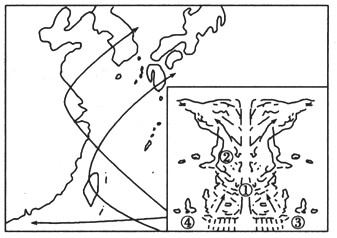问题
综合
读“台风路径示意图”,回答下列问题。

(1)每年_______________季节,我国_________________地区频受台风影响。
(2)除我国以外,亚洲的下列国家和地区中,受台风袭击的还有__________________(选择填空)。
A、日本B、印度C、菲律宾D、巴基斯坦
(3)在台风剖面图中①—④分别代表的内容是:①___________,②____________,③_____________,④______________。
(4)______________是全球台风发生频率最高、强度最大的海域。_______________是世界上受台风影响最大的国家之一。
(5)台风灾害主要是由强风、特大和造成。减轻台风灾害的重要措施有___________和___________。
答案
(1)夏秋;东部沿海
(2)AC
(3)台风眼;云墙;旋涡风雨区;外围大风区
(4)西北太平洋;中国
(5)暴雨;风暴潮;监测;预报
